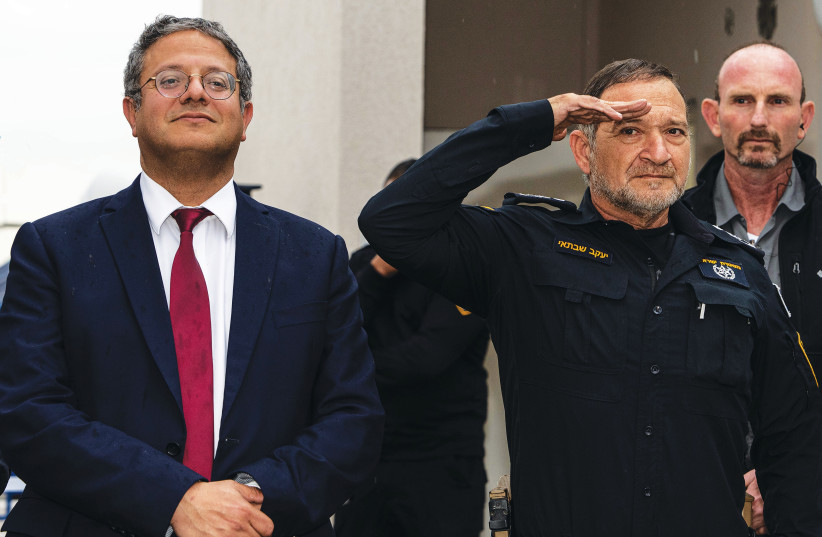Attorney-General Gali Baharav-Miara and Israel Police Chief Kobi Shabtai are against the establishment of a National Guard under the control of the National Security Ministry on Sunday morning.
Baharav-Miara reportedly contended that there is a legal impediment in advancing the law, according to the National Security Ministry legal adviser. N12 reported that the legal difficulties were over the overlapping of duties between such a National Guard and the Israel Police.
The ministry's legal adviser also note that the proposal required establishing the National Guard's legal status, its ability to indict and direct suspects into the judicial system, procedure for rights and duties for the officers, as well as a legal consulting arm. It was suggested that a committee be formed with the defense minister and other security officials to oversee these matters.
Legislation is also required to enshrine the National Guard's powers and responsibilities into law within 90 days from the government's approval of the plan.
National Security Minister Itamar Ben-Gvir attacked Baharav-Miara for her opposition to the National Guard plan, which he argued was needed to restore order in the streets. Ben-Gvir said that Baharav-Miara didn't understand her role as attorney-general.

"Almost two years have passed since the [Operation] Guardian of the Walls events where we saw how the police didn't succeed in responding quickly and smoothly, in those days it was clear why there is a need for a National Guard to deal with exactly the same problems," said Ben-Gvir. "There is no one to take care of the security in the Arab sector which is plagued by murders. Our wonderful police officers do as much as they can to provide security and service to citizens, but they are overloaded with work and unable to get to everything, every police officer who goes on duty has dozens of tasks, it's crazy. That's why we need the National Guard."
"There is no one to take care of the security in the Arab sector which is plagued by murders."
National Security Minister Itamar Ben-Gvir
Shabtai warned that the establishment of the new system would damage the function of internal state security and the ability for police to fulfill their responsibilities.
"Establishing an additional security body in the State of Israel, especially one whose areas of responsibility and activity overlap with those of the Israel Police, is a decision that has dramatic consequences for the internal security of the State of Israel," Shabtai said according to Maariv.
Shabtai said that the reasons for establishing an expanded National Guard were unclear, saying that it was a waste of resources for an unproven model in which staff engaged in the same activities. Overlapping duties would create power struggles, a lack of responsibility and a lack of chain of command.
Ben-Gvir responded to the police chief by calming that the senior police officers didn't want a National Guard over ego issues and that the police had been asked to present a plan on the matter three months ago.
The duties that the National Guard would address, according to the National Security Ministry statement, would be "personal security," illegal weapons, crime wars and "agricultural terrorism."
Likud MK Boaz Bismuth dismissed the police chief's warning, saying that Ben-Gvir wouldn't be able to do whatever he wanted with the National Guard, and the Prime Minister Benjamin Netanyahu was still in charge.
Labor MK Gilad Kariv said that Ben-Gvir had prevented Shabtai from presenting his opinion on the National Guard at the recent cabinet meeting.
Former Israel Police chief Moshe Karadi had attacked Ben-Gvir on Saturday as a danger to the state and expressed concern over the fate of the Israel Police and IDF.
March saw a power struggle between Ben-Gvir, police brass, and the atorney-general. While Ben-Gvir has the legal authority to create general policy for the police, the Attorney-General warned on March 16 that he had crossed the line in issuing direct orders to officers during ongoing operations for the judicial reform protests. The High Court of Justice barred Ben-Gvir from issuing a direct order to the police on March 19.
Ben-Gvir's ability to establish general policy and principles for the Police was established in December 27 as part of the first part of the controversial "Police law."
Government will discuss implementation
On Sunday morning the government is set to discuss the implementation of a deal between Ben-Gvir and Prime Minister Benjamin Netanyahu, which would give the Otzmah Yehudit leader control of the security body in return for support for a pause in judicial reform legislation.
